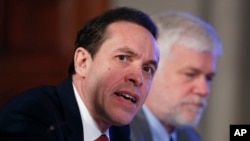The U.S. state of New York is moving to ban the oil and gas drilling technique known as "fracking," following the release of a report highlighting health and environmental risks.
Hydraulic fracturing has created a fossil-fuel boom in the United States, raising domestic energy production and reducing imports. But reports of polluted water and leaking fumes near fracking wells have fueled vigorous opposition. Many New York towns had already restricted fracking.
The state report cites potential impacts on air and water quality, uncertain health effects, increased risk of earthquakes, and noise and traffic problems linked to fracking projects. It says there is not enough information to decide whether the risks are worth the benefits.
"I think it would be reckless to proceed in New York until more authoritative research is done," said the state health commissioner, Howard Zucker. "I asked myself, 'Would I let my family live in a community with fracking?' The answer is no. I therefore cannot recommend anyone else's family to live in such a community, either."
Hydraulic fracturing involves pumping high-pressure water, sand and chemicals into rock formations deep underground. Fracturing the rock releases oil and gas trapped inside.
New York sits on the northernmost section of the Marcellus Shale, a rock formation containing huge amounts of natural gas. Most of the formation lies beneath Pennsylvania and West Virginia, which are peppered with thousands of fracking wells. Pennsylvania has the nation's second-largest proven natural gas reserves.
The New York State Petroleum Council called the ban politically motivated and misinformed. It said Wednesday that regulations already protect health and the environment, and that hydraulic fracturing could have brought major economic benefits to the state.
"This is a missed opportunity to share in the American energy renaissance, and for New York’s future prosperity," said executive director Karen Moreau.





